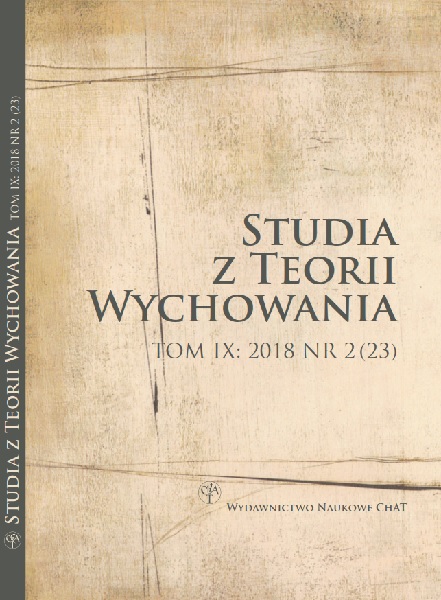Dialog mimo wszystko
After all, the dialogue wins
Author(s): Dorota JankowskaSubject(s): Social Sciences, Education
Published by: Wydawnictwo Naukowe ChAT
Keywords: dialogue; discourse; existence; authenticity; emancipation and pedagogy; critical pedagogy
Summary/Abstract: The article examines the circumstances and reasons for the contemporary interest in dialogue in the humanities and social sciences as well as in social reality. It presents observations and reflections on the role of dialogue in the new paradigm of „open” pedagogy which assumes human dialogue capacity and which is built on the critical and emancipatory rationality. It identifies pedagogy as a special form of social communication, of which the main task is to contribute to the exchange of knowledge and experiences: in the layer of theory between different orientations and positions and in the layer of practice between generations and cultures. It deals with the issues of dialogue precisely in these two areas: contemporary theory and pedagogical practice. In the article the humanistic belief in dialogue and its emancipatory potential is confronted with a negative diagnosis of the educational status of the practice. Th e statement that education still remains a tool in the hands of the authorities interested in maintaining the status quo and being reluctant to dialogue, according to the author, reveals the weaknesses of the humanistic project but does not undermine the very idea of the dialogue. This is underlined by the title: „After all, the dialogue wins”. Artykuł rozpatruje okoliczności i powody współczesnego zainteresowania dialogiem tak w humanistyce i naukach społecznych jak i rzeczywistości społecznej. Prezentuje spostrzeżenia i refleksje na temat miejsca jakie zajmuje dialog w nowym paradygmacie pedagogiki „otwartej” , zakładającym dialogiczność człowieka i zbudowanym na krytyczno-emancypacyjnej racjonalności. Pedagogikę identyfikuje jako szczególną formą komunikacji społecznej, której głównym zadaniem jest przyczynianie się do wymiany wiedzy i doświadczeń: w warstwie teorii pomiędzy różnymi orientacjami i stanowiskami, a w warstwie praktyki pomiędzy pokoleniami i kulturami . Kwestie dialogu rozpatruje właśnie w tych dwóch płaszczyznach: współczesnej teorii i praktyki pedagogicznej. W artykule humanistyczna wiara w dialog i jego emancypacyjny potencjał zostaje konfrontowana z negatywną diagnozą stanu edukacyjnej praktyki. Konstatacja, że edukacja nadal pozostaje narzędziem w rękach władzy, zainteresowanej utrzymaniem status quo i niechętnej dialogowi, zdaniem autorki ujawnia słabości humanistycznego projektu, ale nie podważa samej idei dialogu. Podkreśla to tytuł: „Dialog mimo wszystko”.
Journal: Studia z Teorii Wychowania
- Issue Year: IX/2018
- Issue No: 2 (23)
- Page Range: 61-78
- Page Count: 18
- Language: Polish

